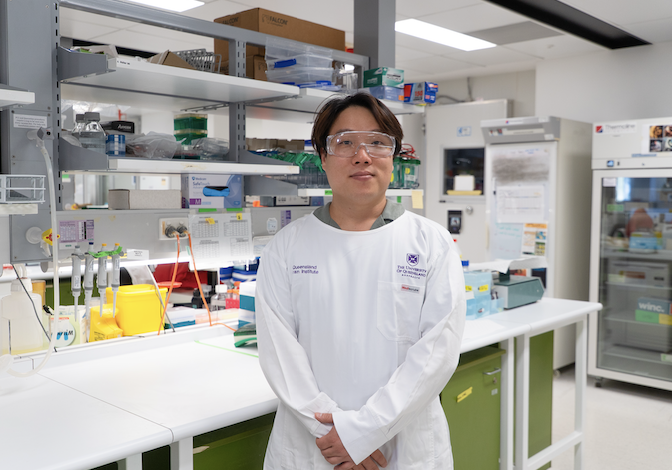The Queensland Brain Institute (QBI) has appointed Dr John Lee as its new Ross Maclean Senior Research Fellow, marking the return of a researcher whose career was first shaped by the very fellowship he now holds.
Dr Lee’s pathway to neuroscience began at the University of Auckland, where his fascination with the brain led him to University of Queensland’s School of Biomedical Sciences in 2008 for an honours project with Professor Peter Noakes. While at QBI, he also worked alongside Dr Robyn Wallace, the then Ross Maclean Fellow, sparking his enduring focus on motor neurone disease (MND).
MND is a debilitating neurological disease for which there are currently no therapies that have a meaningful benefit for patients.
“MND really grabbed me,” Dr Lee said.
“It’s a brain disease but it also affects the muscles. It’s devastating and it’s terminal, and I wanted to see if I could actually help.”

Since then, Dr Lee has built his career at the intersection of neuroscience, immunology and patient care. Mentored by UQ’s Professor Trent Woodruff and neurologist Professor Pamela McCombe, he balances laboratory research with regular hospital visits to collect patient blood samples.
That dual approach has defined his investigations into neuroinflammation, which is the immune system’s overreaction to dying neurons.
“At first the immune system tries to clear away damage,” Dr Lee said.
“But over time it becomes like a fire that spreads out of control.
“Our goal is to be the fire extinguisher – too cool it down before more harm is done.”

Dr Lee’s translational research has already reached clinical testing. A compound he began studying during his PhD in 2009 recently completed Phase 1B trials after more than 15 years of development. He is also collaborating with a New Zealand company to design liquid drug formulations tailored for MND patients who lose the ability to swallow.
In Australia, there is only one drug approved for MND treatment and it extends a person’s lifespan by a couple of months but doesn’t improve a person’s quality of life. In the US, there are two drugs approved for use by the Food and Drug Administration, however, both have limited efficacy.
Beyond MND, Dr Lee’s work on metabolic pathways in immune cells could extend to other neurodegenerative diseases, a prospect that has attracted growing pharmaceutical interest.
According to Dr Lee, the Ross Maclean Fellowship offers crucial support to advance these ambitious projects.
“Funding is always scarce in research – this fellowship gives me the opportunity to push drug programs closer to clinical trials while also collaborating with QBI neuroscientists on new discovery-based ideas.”
His ultimate goal remains simple: to slow the course of MND and ease the burden on patients.
“Even if we can’t cure it yet, improving quality of life would be a huge step forward.”
QBI’s Ross Maclean Senior Research Fellow was established in memory of Index Group founder, Ross Maclean, who lost his battle with MND in 2005.
Mr Maclean’s company, the Index Group – ranked among Queensland’s top 400 privately owned companies – is led by his son, Jeff Maclean, who continues to support the Ross Maclean Senior Research Fellowship for MND Research in honour of his father’s legacy.



